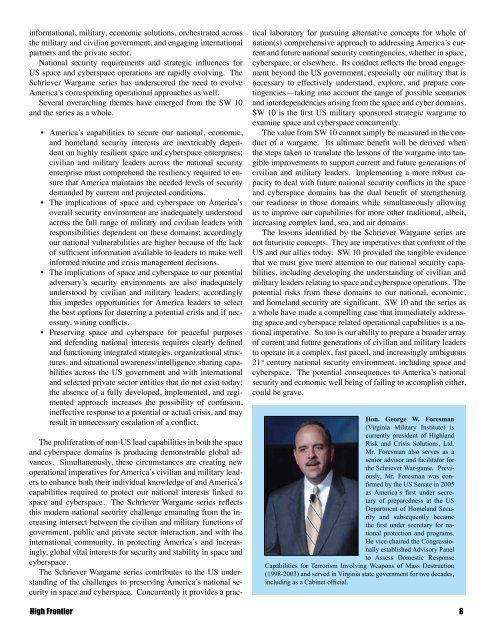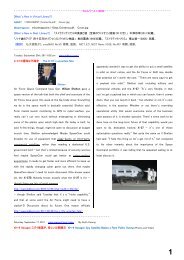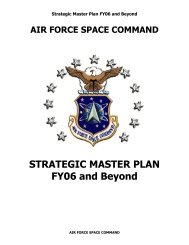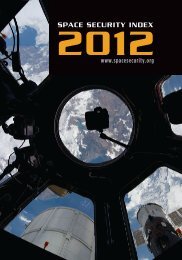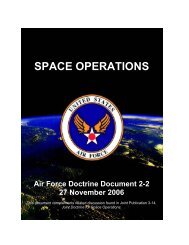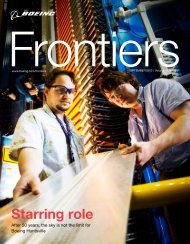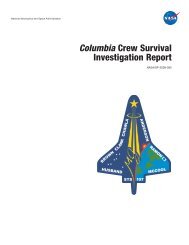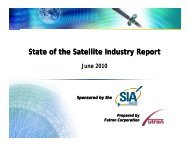Schriever Wargame 2010 - Air Force Space Command
Schriever Wargame 2010 - Air Force Space Command
Schriever Wargame 2010 - Air Force Space Command
Create successful ePaper yourself
Turn your PDF publications into a flip-book with our unique Google optimized e-Paper software.
informational, military, economic solutions, orchestrated across<br />
the military and civilian government, and engaging international<br />
partners and the private sector.<br />
National security requirements and strategic influences for<br />
US space and cyberspace operations are rapidly evolving. The<br />
<strong>Schriever</strong> <strong>Wargame</strong> series has underscored the need to evolve<br />
America’s corresponding operational approaches as well.<br />
Several overarching themes have emerged from the SW 10<br />
and the series as a whole.<br />
• America’s capabilities to secure our national, economic,<br />
and homeland security interests are inextricably dependent<br />
on highly resilient space and cyberspace enterprises;<br />
civilian and military leaders across the national security<br />
enterprise must comprehend the resiliency required to ensure<br />
that America maintains the needed levels of security<br />
demanded by current and projected conditions.<br />
• The implications of space and cyberspace on America’s<br />
overall security environment are inadequately understood<br />
across the full range of military and civilian leaders with<br />
responsibilities dependent on these domains; accordingly<br />
our national vulnerabilities are higher because of the lack<br />
of sufficient information available to leaders to make well<br />
informed routine and crisis management decisions.<br />
• The implications of space and cyberspace to our potential<br />
adversary’s security environments are also inadequately<br />
understood by civilian and military leaders; accordingly<br />
this impedes opportunities for America leaders to select<br />
the best options for deterring a potential crisis and if necessary,<br />
wining conflicts.<br />
• Preserving space and cyberspace for peaceful purposes<br />
and defending national interests requires clearly defined<br />
and functioning integrated strategies, organizational structures,<br />
and situational awareness/intelligence sharing capabilities<br />
across the US government and with international<br />
and selected private sector entities that do not exist today;<br />
the absence of a fully developed, implemented, and regimented<br />
approach increases the possibility of confusion,<br />
ineffective response to a potential or actual crisis, and may<br />
result in unnecessary escalation of a conflict.<br />
The proliferation of non-US lead capabilities in both the space<br />
and cyberspace domains is producing demonstrable global advances.<br />
Simultaneously, these circumstances are creating new<br />
operational imperatives for America’s civilian and military leaders<br />
to enhance both their individual knowledge of and America’s<br />
capabilities required to protect our national interests linked to<br />
space and cyberspace. The <strong>Schriever</strong> <strong>Wargame</strong> series reflects<br />
this modern national security challenge emanating from the increasing<br />
intersect between the civilian and military functions of<br />
government, public and private sector interaction, and with the<br />
international community, in protecting America’s and increasingly,<br />
global vital interests for security and stability in space and<br />
cyberspace.<br />
The <strong>Schriever</strong> <strong>Wargame</strong> series contributes to the US understanding<br />
of the challenges to preserving America’s national security<br />
in space and cyberspace. Concurrently it provides a practical<br />
laboratory for pursuing alternative concepts for whole of<br />
nation(s) comprehensive approach to addressing America’s current<br />
and future national security contingencies, whether in space,<br />
cyberspace, or elsewhere. Its conduct reflects the broad engagement<br />
beyond the US government, especially our military that is<br />
necessary to effectively understand, explore, and prepare contingencies—taking<br />
into account the range of possible scenarios<br />
and interdependencies arising from the space and cyber domains.<br />
SW 10 is the first US military sponsored strategic wargame to<br />
examine space and cyberspace concurrently.<br />
The value from SW 10 cannot simply be measured in the conduct<br />
of a wargame. Its ultimate benefit will be derived when<br />
the steps taken to translate the lessons of the wargame into tangible<br />
improvements to support current and future generations of<br />
civilian and military leaders. Implementing a more robust capacity<br />
to deal with future national security conflicts in the space<br />
and cyberspace domains has the dual benefit of strengthening<br />
our readiness in those domains while simultaneously allowing<br />
us to improve our capabilities for more other traditional, albeit,<br />
increasing complex land, sea, and air domains.<br />
The lessons identified by the <strong>Schriever</strong> <strong>Wargame</strong> series are<br />
not futuristic concepts. They are imperatives that confront of the<br />
US and our allies today. SW 10 provided the tangible evidence<br />
that we must give more attention to our national security capabilities,<br />
including developing the understanding of civilian and<br />
military leaders relating to space and cyberspace operations. The<br />
potential risks from these domains to our national, economic,<br />
and homeland security are significant. SW 10 and the series as<br />
a whole have made a compelling case that immediately addressing<br />
space and cyberspace related operational capabilities is a national<br />
imperative. So too is our ability to prepare a broader array<br />
of current and future generations of civilian and military leaders<br />
to operate in a complex, fast paced, and increasingly ambiguous<br />
21 st century national security environment, including space and<br />
cyberspace. The potential consequences to America’s national<br />
security and economic well being of failing to accomplish either,<br />
could be grave.<br />
Hon. George W. Foresman<br />
(Virginia Military Institute) is<br />
currently president of Highland<br />
Risk and Crisis Solutions, Ltd.<br />
Mr. Foresman also serves as a<br />
senior advisor and facilitator for<br />
the <strong>Schriever</strong> War-game. Previously,<br />
Mr. Foresman was confirmed<br />
by the US Senate in 2005<br />
as America’s first under secretary<br />
of preparedness at the US<br />
Department of Homeland Security<br />
and subsequently became<br />
the first under secretary for national<br />
protection and programs.<br />
He vice-chaired the Congressionally<br />
established Advisory Panel<br />
to Assess Domestic Response<br />
Capabilities for Terrorism Involving Weapons of Mass Destruction<br />
(1998-2003) and served in Virginia state government for two decades,<br />
including as a Cabinet official.<br />
High Frontier 8


